Hi Phoenix friends,
We just launched something you've been asking for…
Your blood test is lying to you (here's why)
Your doctor says your blood work is "normal."
It's not.
Let me show you the problem.
The 95% problem
Most lab ranges come from the middle 95 percent of people the lab considers "healthy."
Sounds scientific.
Until you realize: The average American is overweight, inflamed, and insulin resistant.
So as the population gets sicker, the "normal" range shifts with it.
This is why "normal" does not mean optimal.
It only means average.
And average is sick.
Then there's our APOE4 problem
Even if lab ranges were based on healthy people... we're not like everyone else.
APOE4 carriers have different lipid metabolism. Different inflammatory responses. Different oxidative stress patterns.
What's "optimal" for the general population doesn't work for us.
Example: ApoB
"Normal" lab range: 40-125 mg/dL
General optimal: Under 80 mg/dL
APOE4 3/4 optimal: Under 70 mg/dL
APOE4 4/4 optimal: Under 60 mg/dL
Standard labs won't tell you this.
Your doctor doesn't know this.
The research exists. But nobody's translated it for you.
Until now.
The Phoenix Blood Test Analyzer
We just launched a module that fixes this.
You use your own provider. Your regular doctor. Quest. LabCorp. Private labs like Marek Health or Life Extension. Whoever you trust.
Then you upload the results to Phoenix for deep analysis.
Why we do it this way:
You already have a relationship with your doctor or preferred lab. We're not trying to replace that. We're adding the APOE4-specific interpretation layer that's missing everywhere else.
Plus, most members already have 3-5 old blood tests sitting in a drawer. Upload them all. Get insights immediately.
1. Instant biomarker extraction
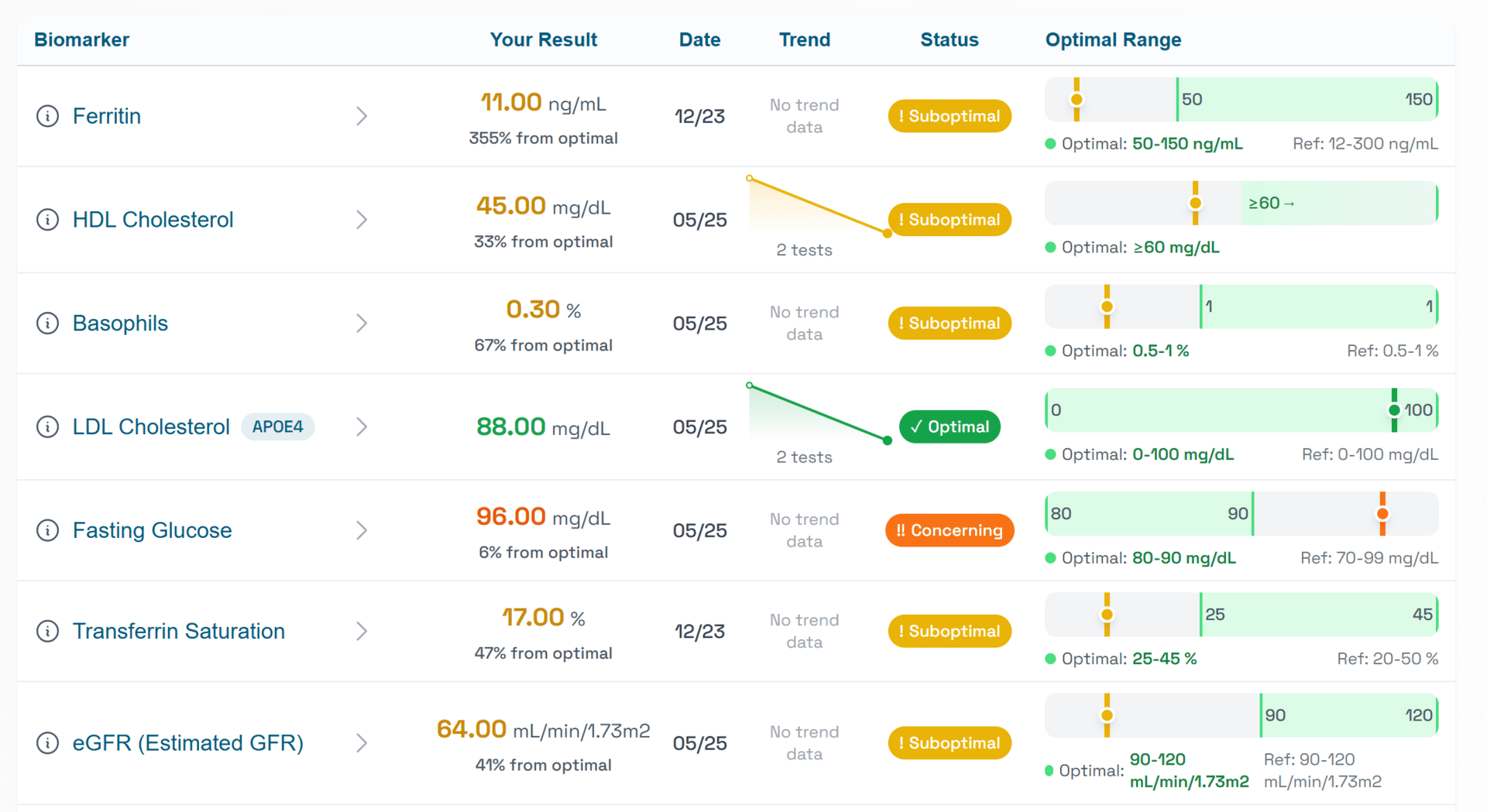
Upload a PDF from Quest, LabCorp, or any lab.
AI reads it. Extracts every marker. 30 seconds.
2. APOE4-specific interpretation
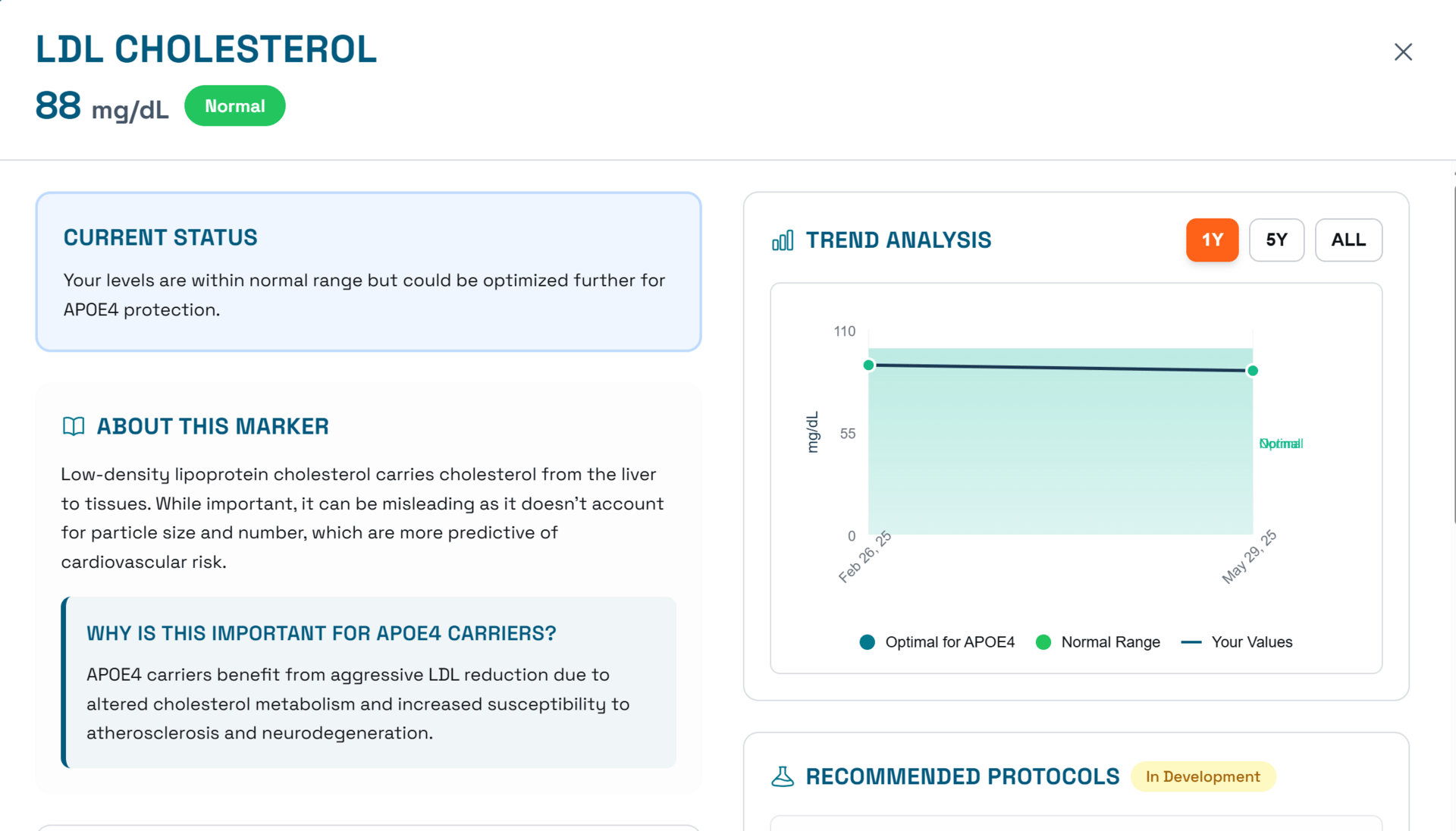
Here's where it gets real.
Not just a number. Context.
Why This Matters for APOE4
The science. In plain English.
Trend Analysis
That's how you know if your interventions are working.
3. Your Phoenix Score
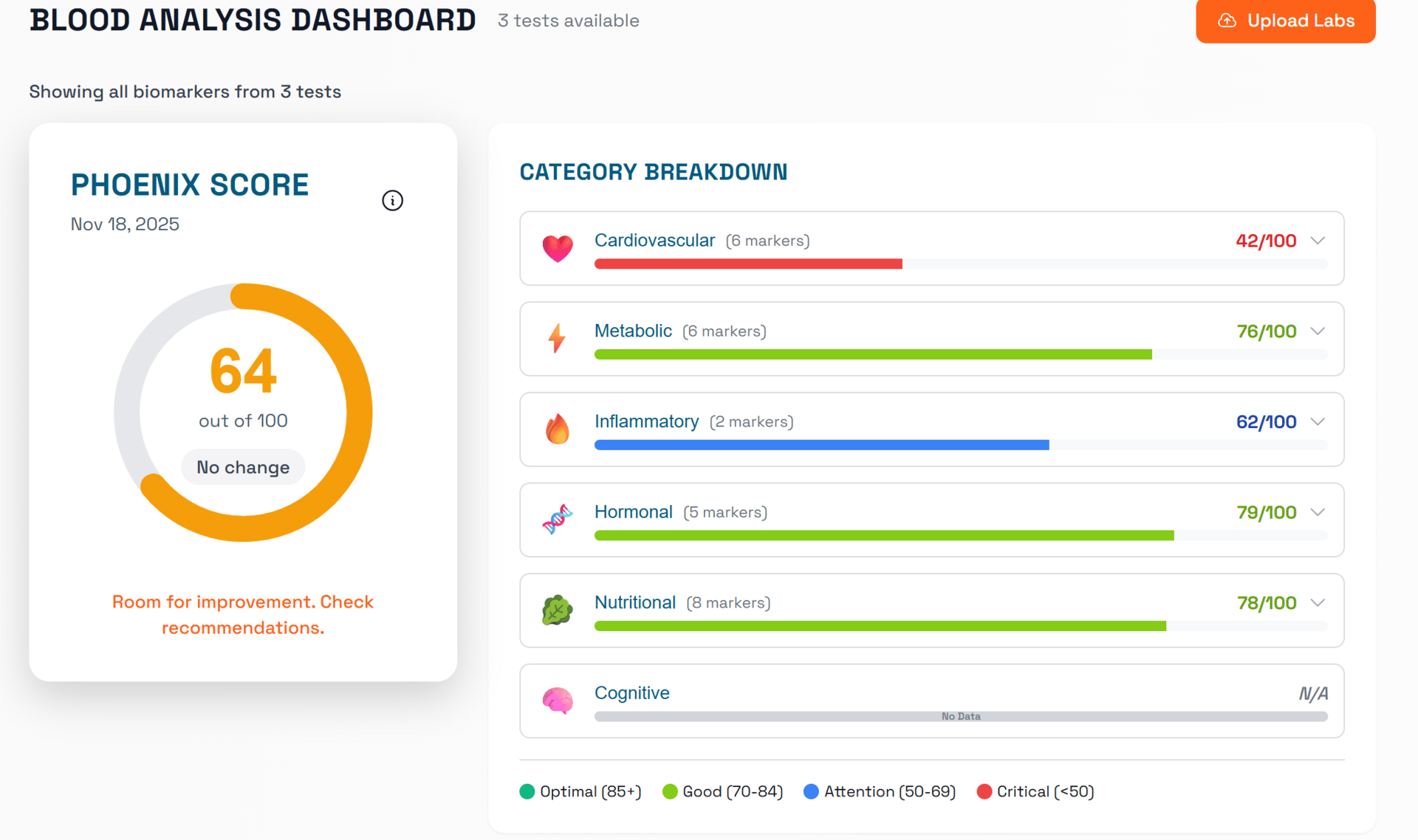
One number that tells you: how optimized are you?
Breaks down by category:
Cardiovascular:
Metabolic
Inflammatory
Hormonal
Nutritional
Cognitive
It tells you where to focus. Not everything at once. What matters most right now.
4. AI-powered recommendations
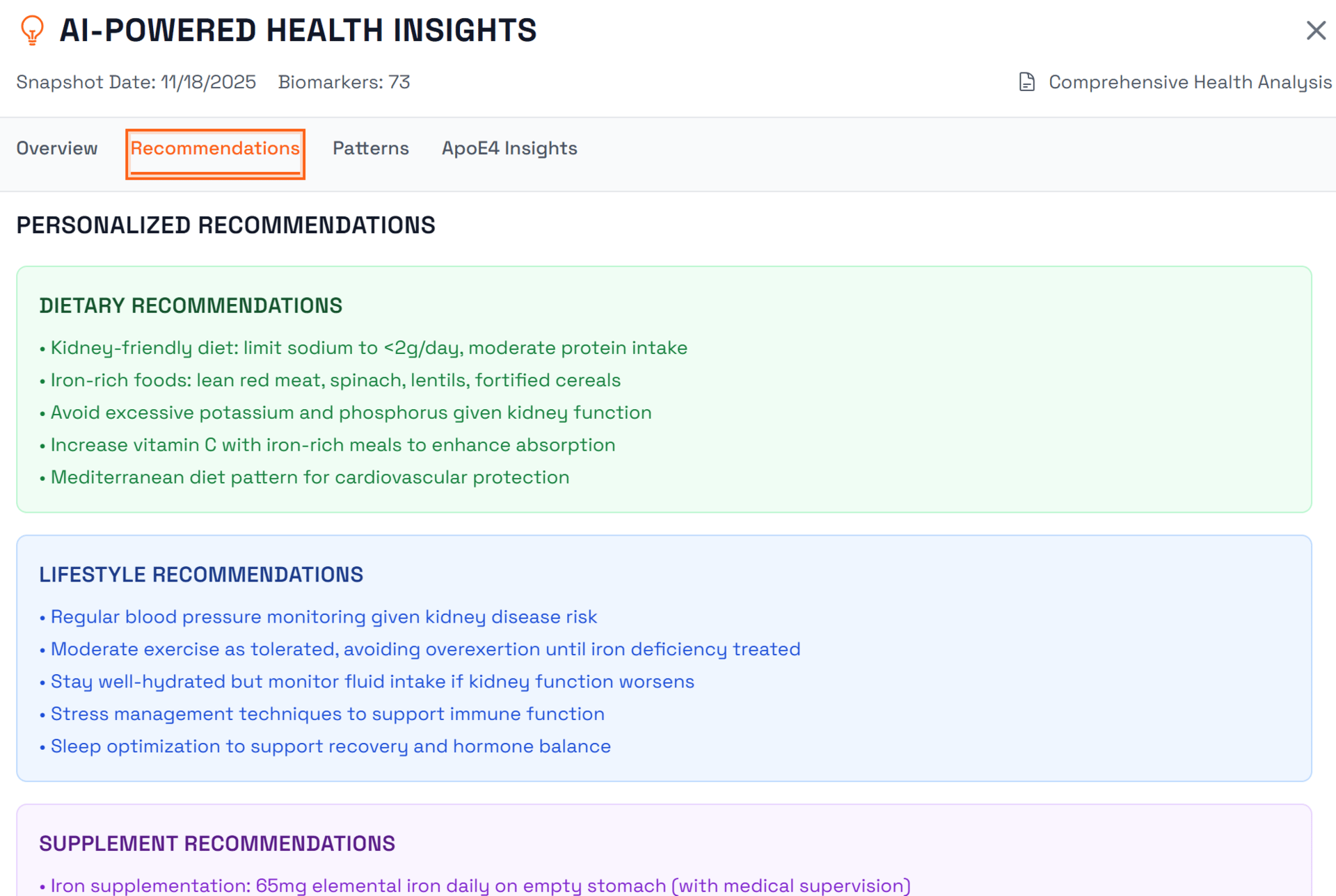
Based on your actual biomarkers, you get:
Dietary recommendations:
Lifestyle recommendations
Supplement recommendations
Not generic advice. Your specific numbers → specific actions.
5. APOE4-specific insights
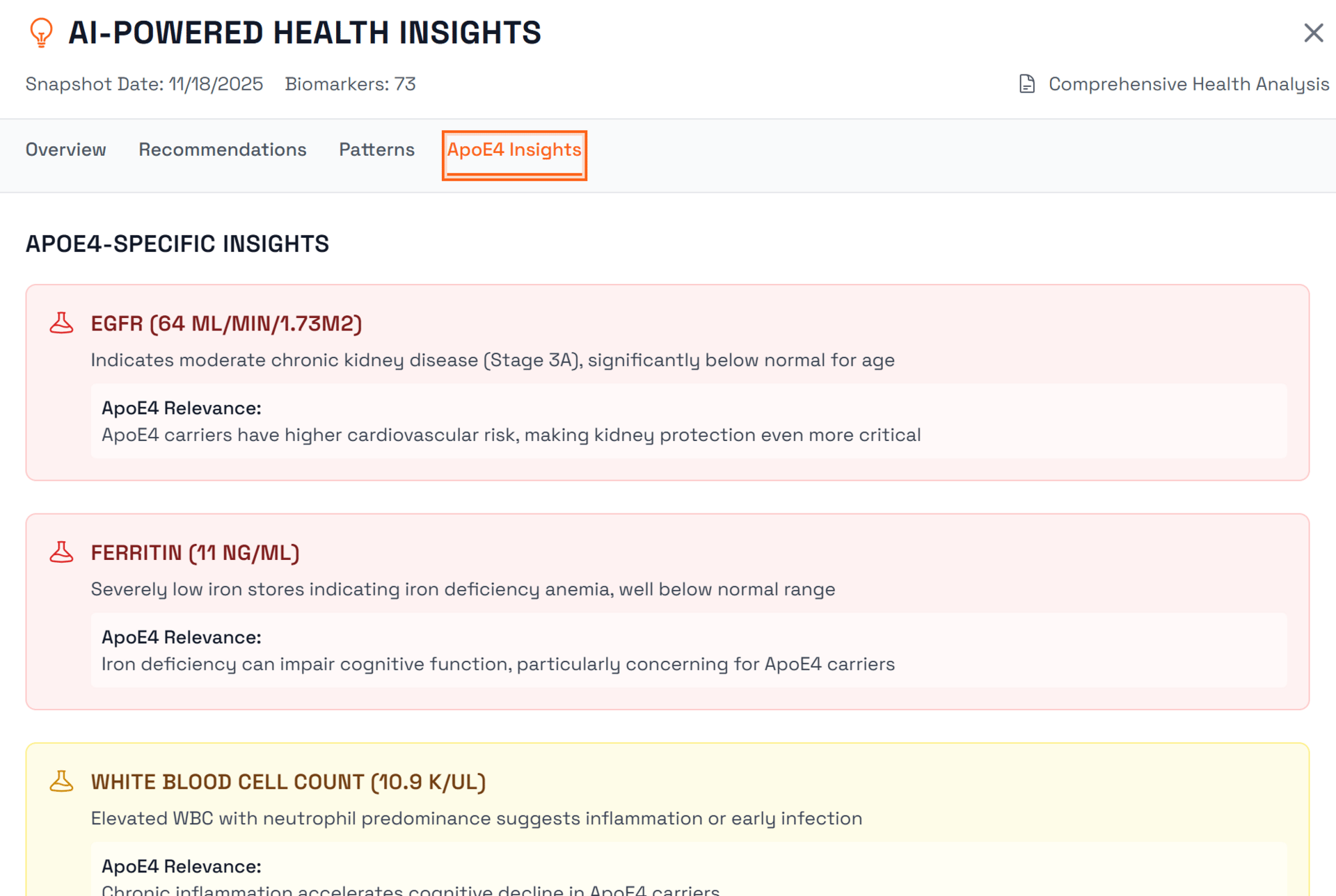
This is the killer feature.
Every concerning biomarker gets an APOE4-specific explanation:
Same blood test. APOE4-specific lens.
Not a Phoenix Member yet?
Lock in lifetime access to the Phoenix Community: $499 one-time (switching to $499/year soon)
What's coming: Community intelligence
Right now, the module shows you YOUR data with APOE4-specific ranges.
Soon, it shows you what worked for people like you.
Example (future state):
You see your ApoB is 85 mg/dL. Target: under 60.
Click "What works for members like me?"
The AI shows:
"Based on 47 APOE4 3/4 carriers (age 45-60, baseline ApoB 80-100 mg/dL, similar metabolic profile):
Most effective interventions:
Zone 2 cardio (200+ min/week): 82% response rate, avg 22% reduction
High EPA fish oil (4-5g/day): 68% response rate, avg 18% reduction
Very low-carb diet (<75g/day): 71% response rate, avg 19% reduction
Seed oil elimination: 54% response rate, avg 12% reduction
Your predicted stack: Based on your genetics (APOE4 3/4, MTHFR +/+), baseline markers (TG 145, HDL 48), and lifestyle factors (moderate exercise history), you're likely a high responder to omega-3s and cardiovascular exercise.
Predicted outcome: ApoB reduction to 58-64 mg/dL within 12 weeks with Zone 2 (250 min/week) + fish oil (5g/day) + low-carb (<100g/day).
Success probability: 76% (based on your cluster)
Members in your cluster who tried this combination:
Sarah M. (3/4, age 52): ApoB 92 → 61 in 10 weeks
David K. (3/4, age 48): ApoB 88 → 59 in 14 weeks
Jennifer T. (3/4, age 56): ApoB 95 → 68 in 12 weeks
Next blood test recommended: 12-16 weeks"
That's the vision.
Not just: "Your ApoB is high."
But: "Here's what worked for 47 people just like you. Here's your predicted outcome. Here's when to retest."
Precision medicine. Powered by community data.
The 360-degree health view (what's coming)
The blood test module isn't standalone.
It's the first piece of a larger system.
Here's the full vision:
You upload blood tests. Track biomarkers over time.
You log interventions. Supplements. Diet changes. Exercise protocols.
The AI connects them:
"Between March and June, your ApoB dropped 27%."
"During that period, you started:"
Daily fish oil (4g EPA/DHA)
Zone 2 cardio (200 min/week)
Eliminated seed oils
"Based on 47 members with similar profiles:"
Fish oil: 68% saw ApoB reduction (avg 18%)
Zone 2: 82% saw reduction (avg 22%)
Seed oil elimination: 54% saw reduction (avg 12%)
"Your response pattern matches Cluster 3 (high responders to cardio + omega-3)."
"Next optimization: Try increasing Zone 2 to 250 min/week. Predicted additional 8-12% reduction based on similar APOE4 3/4 carriers in your age group."
That's the goal.
Not just tracking. Prediction.
Not just data. Insights.
Not generic advice. What works for people like YOU.
Real example (how this plays out):
Meet David. 48. APOE4 4/4. Total cholesterol 220 mg/dL.
His doctor: "You're in the normal range. Keep doing what you're doing."
He joins Phoenix. Uploads the same lab report his doctor just reviewed.
We show him: Total cholesterol is misleading. His ApoB is 88 mg/dL. LDL particle count is 1,650 nmol/L. Small dense LDL particles: 720 nmol/L. ALT is 38 U/L.
Target for APOE4 4/4:
ApoB: Under 60 mg/dL (he's at 88 - 76% above target)
LDL-P: Under 700 nmol/L (he's at 1,650 - 136% above target)
Small dense LDL: Under 300 nmol/L (he's at 720 - 140% above target)
ALT: Under 30 U/L (he's at 38)
His doctor said "normal." We showed him he's at massive risk.
As a 4/4 carrier with 60% lifetime Alzheimer's risk, these numbers aren't just "suboptimal." They're dangerous.
Same blood test. Different interpretation. Life-saving difference.
He orders advanced lipid testing from his doctor (NMR LipoProfile). Uploads those results too.
Then he looks at what worked for similar 4/4 members:
High EPA fish oil (5-6g/day): 18-24% ApoB reduction
Very low-carb diet (<50g/day): 22-28% reduction
Zone 2 cardio (250+ min/week): 25-35% reduction
Elimination of all seed oils: 10-15% reduction
He goes aggressive. All five interventions. Tracks everything.
16 weeks later: Gets new blood work from his regular lab. Uploads it.
Results:
ApoB: 46 mg/dL (down from 88 - 48% reduction)
LDL-P: 620 nmol/L (down from 1,650 - 62% reduction)
Small dense LDL: 210 nmol/L (down from 720 - 71% reduction)
ALT: 24 U/L (down from 38 - normalized)
TG: 68 mg/dL (down from 125)
HDL: 62 mg/dL (up from 54)
Started with low-dose rosuvastatin (5mg) prescribed by his doctor. Combined with lifestyle. Now he's in the 4/4 target zone.
The app tells him:
"Your response pattern is exceptional. ApoB reduction of 48% places you in the top 15% of responders in your cohort (APOE4 4/4, age 45-55, baseline ApoB 80-100).
Analysis of your intervention stack:
Zone 2 cardio (270 min/week average): Estimated 18-22% reduction
Very low-carb diet (<45g avg): Estimated 15-18% reduction
High EPA fish oil (5.5g/day): Estimated 12-15% reduction
Seed oil elimination: Estimated 8-10% reduction
Your ApoB is now at 46 mg/dL - within optimal range for APOE4 4/4 carriers. This represents a 73% reduction in cardiovascular risk and significant reduction in neuroinflammatory burden.
Next optimization: Consider adding niacin (extended release, 500mg titrating to 1g) to further reduce Lp(a) if elevated. Members with your profile who added niacin showed additional 15-20% Lp(a) reduction. Monitor liver enzymes monthly if implementing.
Cognitive assessment recommended: Establish baseline now that metabolic markers are optimized. This allows us to track if these improvements translate to cognitive protection over time."
That's the power.
Same labs you're already getting. Different analysis. Better outcomes.
We are deploying our own AI tools
PDF extraction - Vision API reads any lab format (Quest, LabCorp, private labs)
Pattern recognition - Identifies what changed between tests, flags concerning trends
Cohort matching - Finds members similar to you (genetics, age, baseline biomarkers, past interventions)
Outcome prediction - Estimates what's likely to work based on your genetics, past responses, and similar members' results
This eventually will costs us ~$10/month per active member once all the apps are deployed.
That's why we can't keep founder pricing forever.
Right now our Founding Member offer is $499 one-time. Lifetime access.
Soon: $499/year for new members.
We're building AI features that have ongoing costs. The economics changed.
Current members? You're grandfathered. Forever.
Considering joining? This is your window.
What's next (roadmap)
Structured Experiments Module
Pre-built protocols:
Ketogenic diet (APOE4-optimized, not generic keto)
Zone 2 training (with heart rate tracking integration)
Supplement stacks (evidence-based, tested by members)
Track adherence. Measure outcomes. Compare to similar members.
Cognitive Assessment Suite
Science-backed brain games and cognitive training too for:
Executive function
Processing speed
Working memory
Verbal fluency
Track cognitive performance over time. Correlate with your interventions.
Digital Twin Predictions
Upload your genetics (23andMe, AncestryDNA, Nebula). Add your blood work. Log your interventions.
The AI builds your "twin" - predicting:
Which supplements will work (based on genetics + past responses)
Optimal exercise dose (based on age, fitness, APOE status, cardiovascular markers)
Diet modifications (based on metabolic markers, inflammatory profile)
Expected outcome ranges (what similar members achieved)
This is the precision health OS we've been building toward.
Not generic advice.
Not population averages.
What works for YOUR biology.
Let’s beat the odds,
Kevin
Most Newsletters? One-way street.
How boring…
This is the Phoenix Community after all—so let's make it a two-way street.
Got a question? Feedback? Just want to say hi?
Hit reply.
I read every single one.
